Related Research Articles
A drop kick is a type of kick in various codes of football. It involves a player dropping the ball and then kicking it as it touches the ground.
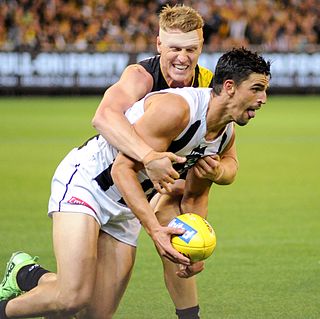
Most forms of football have a move known as a tackle. The primary purposes of tackling are to dispossess an opponent of the ball, to stop the player from gaining ground towards goal or to stop them from carrying out what they intend.
Thomas John Dempsey was an American professional football player who was a placekicker in the National Football League (NFL) for the New Orleans Saints, Philadelphia Eagles, Los Angeles Rams, Houston Oilers and Buffalo Bills. Unlike the "soccer style" approach which was becoming more and more widely used during his career, Dempsey's kicking style was the then-standard straight-toe style. With the Saints in 1970, he made a 63-yard field goal, setting an NFL record which stood for over 40 years.

A penalty kick is a method of restarting play in association football, in which a player is allowed to take a single shot at the goal while it is defended only by the opposing team's goalkeeper. It is awarded when an offence punishable by a direct free kick is committed by a player in their own penalty area. The shot is taken from the penalty mark, which is 11 m from the goal line and centred between the touch lines.
There are many terms used to describe association football, the sport most commonly referred to in the English-speaking world as "football" or "soccer".
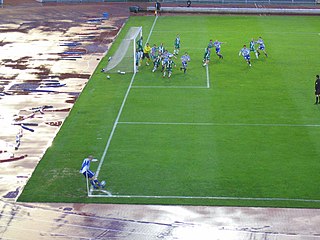
A corner kick is the method of restarting play in a game of association football when the ball goes out of play over the goal line, without a goal being scored and having last been touched by a member of the defending team. The kick is taken from the corner of the field of play nearest to the place where the ball crossed the goal line.

Placekicker, or simply kicker, is the player in gridiron football who is responsible for the kicking duties of field goals and extra points. In many cases, the placekicker also serves as the team's kickoff specialist or punter.
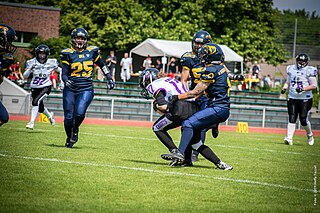
American and Canadian football are gridiron codes of football that are very similar; both have their origins in rugby football, but some key differences exist between the two codes.
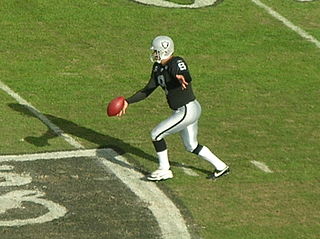
A punter (P) in gridiron football is a special teams player who receives the snapped ball directly from the line of scrimmage and then punts (kicks) the football to the opposing team so as to limit any field position advantage. This generally happens on a fourth down in American football and a third down in Canadian football. Punters may also occasionally take part in fake punts in those same situations, when they throw or run the football instead of punting.
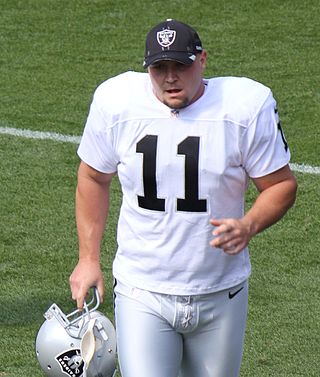
Sebastian Paweł Janikowski is a Polish former American football player who was a placekicker in the National Football League (NFL) for 18 seasons, primarily with the Oakland Raiders. He played college football for the Florida State Seminoles and was selected 17th overall in the 2000 NFL Draft by the Raiders, where he spent all but one season of his professional career. During his final season in the NFL, he played for the Seattle Seahawks.
Russell Erxleben is a former American football player and currency investor. He shares the record for the longest successful field goal in NCAA history at 67 yards, which he set in 1977 while playing for the University of Texas. Erxleben was a three-time All-America punter. He was drafted in the first round of the NFL Draft, an extremely rare occurrence for a kicker. After an NFL career lasting six years, he became a currency investor. Convicted of securities fraud in 1999, he was released from federal prison in 2005. He was again convicted of investment fraud in 2014 and sentenced to 90 months in federal prison.

A mark in Australian rules football is the catch of a kicked ball which earns the catching player a free kick. The catch must be cleanly taken, or deemed by the umpire to have involved control of the ball for sufficient time. A tipped ball, or one that has touched the ground cannot be marked. Since 2002, in most Australian competitions, the minimum distance for a mark is 15 metres.

Raúl Enrique Allegre Rodríguez is a Mexican former football placekicker in the National Football League (NFL) for the Baltimore/Indianapolis Colts, New York Giants, and New York Jets. He played college football at the University of Texas at Austin.

A field goal (FG) is a means of scoring in gridiron football. To score a field goal, the team in possession of the ball must place kick, or drop kick, the ball through the goal, i.e., between the uprights and over the crossbar. The entire ball must pass through the vertical plane of the goal, which is the area above the crossbar and between the uprights or, if above the uprights, between their outside edges. American football requires that a field goal must only come during a play from scrimmage while Canadian football retains open field kicks and thus field goals may be scored at any time from anywhere on the field and by any player. The vast majority of field goals, in both codes, are place kicked. Drop kicked field goals were common in the early days of gridiron football but are almost never done in modern times. In most leagues, a successful field goal awards three points.
John Michael Smith is an English-American retired American football placekicker. He made his professional debut with the New England Patriots in 1974, remaining with the team until 1983.

The place kick is a type of kicking play commonly used in American football, association football (soccer), Canadian football, rugby league, and rugby union. It was historically used in Australian rules football, but it was phased out of the game more than 100 years ago.

A kick is a skill in association football in which a player strikes the ball with their foot. Association football, more commonly referred to as football and also known as soccer, is a sport played world-wide, with up to 265 million people around the world participating on a yearly basis. Kicking is one of the most difficult skills to acquire in football. This skill is also vitally important, as kicking is the way in which passes are made and the primary means by which goals are scored.

Barefoot is the state of not wearing any footwear.
Chris Sailer is an American football trainer of kicking specialists. He works with high school placekickers and punters and evaluates them for college football programs. Sailer was named an All-American as both a kicker and a punter while playing college football for the UCLA Bruins. He played professionally in the Arena Football League (AFL).

A free kick is a method of restarting play in association football. It is awarded after an infringement of the laws by the opposing team.
References
- 1 2 Sherrington, Kevin (8 December 2012). "Often overlooked, Texas' Bednarski is the true pioneer of soccer-style kick". The Dallas Morning News . Retrieved 30 December 2014.
- 1 2 srr50 (11 February 2010). "UT's Fred Bednarski: College Football Pioneer". SB Nation. Retrieved 29 December 2014.
- 1 2 Palmer, Christopher (9 February 2010). "Nazi labor camp survivor makes football history". University of Texas at Austin. Retrieved 28 December 2014.